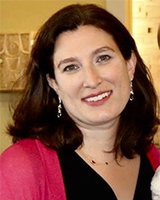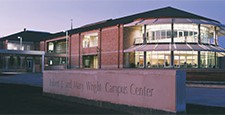Four faculty chairs established in spring 2020 correspond to recently developed academic programs at Austin College. The chairs and programs were endowed through a recent estate gift of William Windsor Richardson ’69 of Sherman.
Students in the Humanities, Sciences, and Social Sciences benefit from the programs that encourage students to identify connections across disciplines and value varied perspectives. The programs guide students to develop skills and abilities in leadership, communication, and collaboration that broaden students’ learning and will serve them in their professional lives.
THE NEW CHAIRS AND CHAIRHOLDERS
The Richardson Chair for the Center for Research, Experience & Transformative Education (CREATE)
 Dr. Lance Barton holds the new Richardson Chair for CREATE, a center that encourages and guides student research and creative scholarship efforts. “The Richardson Chair for CREATE definitely solidifies the college commitment to undergraduate research,” Barton said, who has been director of CREATE since its inception. “Obviously that is also bolstered by the adoption of the applied learning element of our new Compass curriculum. The chair provides resources that will directly help support students and faculty mentors develop, complete, and present their research, scholarly, and creative projects.”
Dr. Lance Barton holds the new Richardson Chair for CREATE, a center that encourages and guides student research and creative scholarship efforts. “The Richardson Chair for CREATE definitely solidifies the college commitment to undergraduate research,” Barton said, who has been director of CREATE since its inception. “Obviously that is also bolstered by the adoption of the applied learning element of our new Compass curriculum. The chair provides resources that will directly help support students and faculty mentors develop, complete, and present their research, scholarly, and creative projects.”
Throughout the academic year, CREATE faculty members provide guidance for all stages of the research process, providing support for researchers, including Departmental Honors Program invitees, Scarbrough Summer Research Fellows, Summer Sciences Research participants, and the more than 200 students presenting research in the Austin College Scholarship Conference.
The Richardson Chair for the Philosophy, Politics, and Economics Program
Dr. Mark Hebert holds the Richardson Chair for the PPE Program. He joined the Austin College faculty in 1990, and the associate professor of philosophy is chair of the Department of Philosophy. He is one of three co-directors of PPE, collaborating with Dr. Daniel Nuckols of the Economics and Business Administration Department and holder of The John T. Jones Chair of Economics; and Dr. Audrey Flemming, assistant professor in the Department of Political Science.
The program is designed to allow students to move beyond a single discipline and engage in an integrated and intentional study of philosophy, political science, and economics in understanding historical events and the relationships between contemporary ideas.
Experiences within the PPE Program allow students to develop skills in critical thinking, public speaking, research methodology, argumentation, and problem solving.
The Richardson Chair for the Professionalism and the Humanities (PATH) Leadership Program
 Dr. Jennifer Johnson-Cooper, associate professor of Chinese, is the director and Richardson Chair for the PATH (Professionalism and the Humanities) Program. “PATH is the very embodiment of why I teach humanities at a liberal arts college,” Johnson-Cooper said. ”I believe that the intellectual frameworks of the humanities are essential for engaging the world. PATH tackles the challenge of how to translate this training into career qualifications by collaborating among students, faculty, alumni, and Career Services to engage five major professional skills gained through a humanities education: creative problem solving, ethical decision making, collaborative work, engaging diversity, and communicating ideas.”
Dr. Jennifer Johnson-Cooper, associate professor of Chinese, is the director and Richardson Chair for the PATH (Professionalism and the Humanities) Program. “PATH is the very embodiment of why I teach humanities at a liberal arts college,” Johnson-Cooper said. ”I believe that the intellectual frameworks of the humanities are essential for engaging the world. PATH tackles the challenge of how to translate this training into career qualifications by collaborating among students, faculty, alumni, and Career Services to engage five major professional skills gained through a humanities education: creative problem solving, ethical decision making, collaborative work, engaging diversity, and communicating ideas.”
Johnson-Cooper said the new endowment will be transformative for PATH, providing funding to bring faculty together in workshops, bring alumni to campus to mentor current students, and other projects that will enrich the role of the humanities in the life of the College.
The Richardson Chair for the STEM Teaching And Research (STAR) Leadership Program
 Dr. John Richardson (no familial relation to the donor) is an associate professor of chemistry and holds the Richardson Chair for STAR Leadership. “The STAR (STEM Teaching and Research) Leadership Program is a uniquely Austin College program, developed by faculty to support students as they embrace the curricular elements of communication, acting responsibly, and logistical planning,” Richardson said. “The program uses interdisciplinary approaches to unite rigorous scientific research with practical leadership theory to generate transferable skills and provide our graduates with the competitive edge needed in today’s mercurial world.”
Dr. John Richardson (no familial relation to the donor) is an associate professor of chemistry and holds the Richardson Chair for STAR Leadership. “The STAR (STEM Teaching and Research) Leadership Program is a uniquely Austin College program, developed by faculty to support students as they embrace the curricular elements of communication, acting responsibly, and logistical planning,” Richardson said. “The program uses interdisciplinary approaches to unite rigorous scientific research with practical leadership theory to generate transferable skills and provide our graduates with the competitive edge needed in today’s mercurial world.”
The STAR program has existed for several years and the professor said the Richardson Endowment solidifies the program’s ability to support faculty innovation and creativity, while providing the flexibility necessary to engage students in a robust curriculum in a genuine and relevant manner. “
Austin College, a private national liberal arts college located north of Dallas in Sherman, Texas, has earned a reputation for excellence in academic preparation, international study, pre-professional foundations, leadership development, committed faculty, and hands-on, adventurous learning opportunities. One of 40 schools profiled in Loren Pope’s influential book Colleges That Change Lives, Austin College boasts a welcoming community that embraces diversity and individuality, with more than 50 percent of students identifying as persons of color. The residential student body of approximately 1,300 students and more than 100 expert faculty members allow a 13:1 student-faculty ratio and personalized attention. Related by covenant to the Presbyterian Church (USA), Austin College cultivates an inclusive atmosphere that supports students’ faith journeys regardless of religious tradition. The College, founded in 1849, is the oldest institution of higher education in Texas operating under original name and charter.



